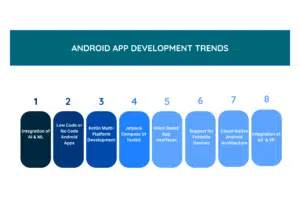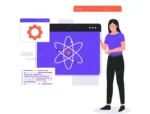The Android ecosystem has been continually evolving over the last decade, and business owners are obliged to stay updated with the latest app development trends to stay relevant in the industry. There are millions of Android users all across the globe, which is increasing the demand for applications that can function smarter, faster, and in a user-friendly manner.
Trends like cloud-based development, AI integration, and others have dominated the technological landscape of 2025, and Android apps are built by adopting them all. So, if you are a budding business owner, it is important that you understand the Android development trends for 2025 and implement them in your project.
Whether you are launching a new app or are upgrading your existing business platform, these trends can help you drive better security, experience, and performance for users.
8 Android App Development Trends in 2025
Here is the list of popular android app development trends 2025 for you to take note of:
1. Integration of Artificial Intelligence (AI) and Machine Learning (ML)
AI and ML are the concepts of this modern-day software world, and are actively shaping the future of Android mobile applications. Developers are now inclined towards integrating AI for voice recognition, smart personalization, automation, and predictive analytics features in Android apps.
Industries like healthcare, e-commerce, banking, and others are now adopting AI functionalities for their Android apps to scale their business efficiency and user experience. As per IBM’s Global AI Adoption Index 2022, more than 77% of businesses are either already using or planning to adopt AI, and this figure isn’t expected to slow down anytime soon.
For instance, brands like Netflix and Spotify use AI and ML capabilities in their apps to make personalized recommendations of shows and songs for users, respectively. Beyond that, apps like Google Assistant and Google Lens also leverage the potential of AI through features like speech recognition and image search.
2. Low Code or No Code Android Apps
In the fast-paced app development landscape, Android developers are now leveraging the use of low-code or no-code platforms for building high-performance apps without much manual coding. Tools like Adalo, Glide, Mendix, Zoho Creator, FlutterFlow, and others are a few of the low-code & no-code tools preferably used for curating Android apps.
These tools have simple drag & drop functionality that allows quick deployment of functional Android apps, backed with lucrative features. It is a cost-effective approach for small businesses, startups, or entrepreneurs to build an Android app for capturing a larger user base while using minimal resources.
For instance, brands like HubSpot, Traverse, and COIN have built their apps using no-code or low-code platforms and are solving several real-world problems. Not just that, but even statistics prove that 4 out of 5 businesses in the US are currently using low-code platforms, which makes it a futuristic trend for newcomers to implement.
Due to the evident shortage of quality developers in the industry, around 84% of businesses are now keen on adopting no-code and low-code tools for filling that technical gap. Thus, it further increases the dominance of this Android app development trend.
3. Kotlin’s Multi-Platform Development Capability
Cross-platform efficiency is now a modern-day necessity for businesses wanting to cater to users across Android, iOS, web, and desktop platforms. Businesses can reduce their cost of developing apps for multiple platforms using Kotlin’s multi-platform capabilities. It is because using this feature of Kotlin enables developers to share business logic while tailoring platform-specific interfaces.
Brands like McDonald’s, Philips Hue, Forbes Magazine, and Netflix have adopted Kotlin’s multi-platform development capabilities for sharing their business logic as well as UI components, seamlessly with the iOS version of their apps. Due to this technological leap by Kotlin, every version of your app will retain the native feel & experience, without the need for writing the logic multiple times.
4. Jetpack Compose UI Toolkit
Jetpack Compose is now the trending UI toolkit preferred for building Android apps, mostly because of its declarative approach. Due to this, developers can tailor their Android app to have a faster, more responsive, and more intuitive interface with less boilerplate code.
As the Android team actively works to scale the efficacy of Jetpack Compose, more than 60% of the top 1000 apps on the Play Store are leveraging the benefits of this UI toolkit. Some of the widely known ones include Airbnb, Hotstar, SoundCloud, Dropbox, Lyft, and Pinterest.
Beyond that, you must know that more than hundreds of thousands of proficient Android developers participated in Compose Camp for learning how to create the best UIs using Jetpack Compose, making it one of the most sought-after trends in the industry.
5. Voice-Based App Interfaces
One of the latest Android app trends includes voice-based interfaces! As the use of voice-based assistants has grown common among users, especially while they interact with diverse apps, developers have had to integrate this feature as a must-have for every Android app they build.
Almost every brand app you interact with today has been integrated with voice-based interfaces, such as Instagram, Spotify, YouTube, Netflix, eBay, and more. For instance, YouTube encourages the use of voice-based navigation or content interaction, whereas eBay uses voice-based interfaces for enabling customers to try on the listed products virtually through their phones.
By adhering to this trend and integrating voice-based interfaces to mobile apps, the conversations between users and virtual assistants feel immensely natural, contributing to the overall experience.
6. Support for Foldable Devices
The innovation quotient in the world of smartphone hardware has been commendable over the past few years, and the foldable phones are evident examples of it. Such foldable devices offer dynamic screen modes to deliver the best value for the money users spend on them. For instance, these phones, when unfolded, offer immersive experiences, and when folded, they encourage portability.
Android apps like Microsoft Office Suite (Excel, Word, etc.), Notion, Kindle, YouTube, Canva, Google Maps, and others have optimized UI for providing the best experience to users on foldable devices.
Moreover, in the year 2023, Android announced that more than 50 Google apps and a lot of other people’s favorite apps are being optimized for foldable screens. Thus, this is what makes it a lucrative Android app development trend for you to embark on!
So for the future, every Android app you build for foldable devices must cater to the flexible UI behavior that they demand. The apps must adapt to different screen dimensions and support multitasking at ease.
7. Cloud-Native Android Architecture
Cloud-based Android app development is now an important approach for building high-performance and scalable business applications. As the new-age businesses aim at delivering unhindered user experiences with optimal speed or storage, a cloud-based native Android app can act as a robust solution.
By integrating cloud services, the Android developers can ensure that the app can efficiently deal with user authentication, cross-platform access, real-time updates, and data synchronization. From storing data of users to delivering on-demand content, cloud-backed Android apps perform better by reducing device load, boosting performance, and improving speed.
Experts believe that more than 95% of all new digital workloads will be shifted to cloud-native architecture by the end of 2025. Not just that, but around 75% of all companies have already shifted their focus to developing cloud-native apps. Some brands that have adopted this trend are Walmart, Airbnb, SoundCloud Pulse, Discord, and more.
8. Augmented Reality (AR) & Virtual Reality (VR)
Among all the Android development trends that exist, the integration of AR & VR capabilities has contributed immensely towards changing the way people use mobile apps. Apps like IKEA Place, Google Maps AR, Google Lens, Pokémon Go, and others are live examples of AR & VR implementation in the app development paradigm.
These are immersive technologies that have been continually getting upgrades and are delivering unique experiences to users. The use of AR & VR is on trend for industries like education, healthcare, real estate, retail, and others. By adhering to this trend, you will be making your app more engaging for users and providing them with immersive virtual experiences.
Why is it Important for Businesses to Keep Up with the Android Development Trends?
The smartphone technology is evolving at a very fast pace, and the expectations of users are also skyrocketing alongside it. Today, users don’t just want to spend hefty money on buying flagship phones, but they also want a premium and feature-rich experience while using their favorite apps on them.
As Android holds a larger smartphone market share, it becomes important for businesses to stay current with the latest app development trends specific to it. And that’s because adhering to Android development trends will help you scale the security, performance, user engagement, and other such attributes of your mobile app.
With outdated features, appeal, and functionalities, your app will miss out on the competitive edge, and users will seek alternatives. Features like gesture-based UI, voice navigation, dark mode, and other such features are part of the recent Android app trends, and ignoring them might lead your app to fail among users.
Beyond features or functionalities, Android app development trends also consist of a progressive shift in the backend infrastructure. With successful implementation, you can ensure your app can perform seamlessly even under immense load or pressure. In the end, the technical choices you make by adhering to the development trends will directly impact the overall user experience.
Let Simpalm Help You Stand Out with the Latest Android App Development Trends!
There is no stopping the ever-evolving Android development trends, and staying ahead of the curve would require a lot more than just basic knowledge about them. You would need an experienced partner to help align the emerging trends & technologies with your business goals. And, that’s where Simpalm can be of your service!
We are a highly trusted Android app development company with specialization in providing our clients with future-ready mobile applications. From ideation & design to development and post-launch maintenance, we ensure complete support, transparency, and service proficiency.
At the same time, our Android developers stay updated with the recent trends and technologies specific to the platform, ensuring they are implemented in your app on demand! Our custom app development solution ensures you get a scalable, secure, high-performance, and user-centric application to run your business on.
Whether you want a completely new Android app built from scratch or want to upgrade an existing one, we have service provision to proficiently handle it all. To know more about our services, feel free to contact us.

 App Development
App Development Web Engineering
Web Engineering AI Services
AI Services Health / Fitness
Health / Fitness Education
Education Social
Social Nonprofit
Nonprofit Fintech
Fintech Logistics
Logistics Government
Government HR Software
HR Software About Simpalm
About Simpalm Our News
Our News Client Testimonials
Client Testimonials Careers
Careers Awards
Awards Resources
Resources Information
Information



